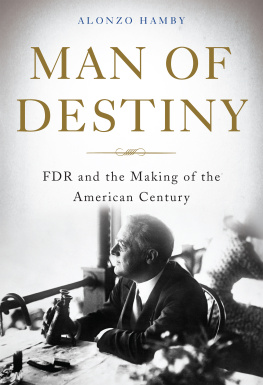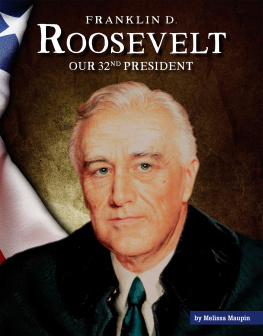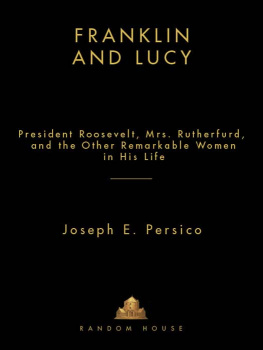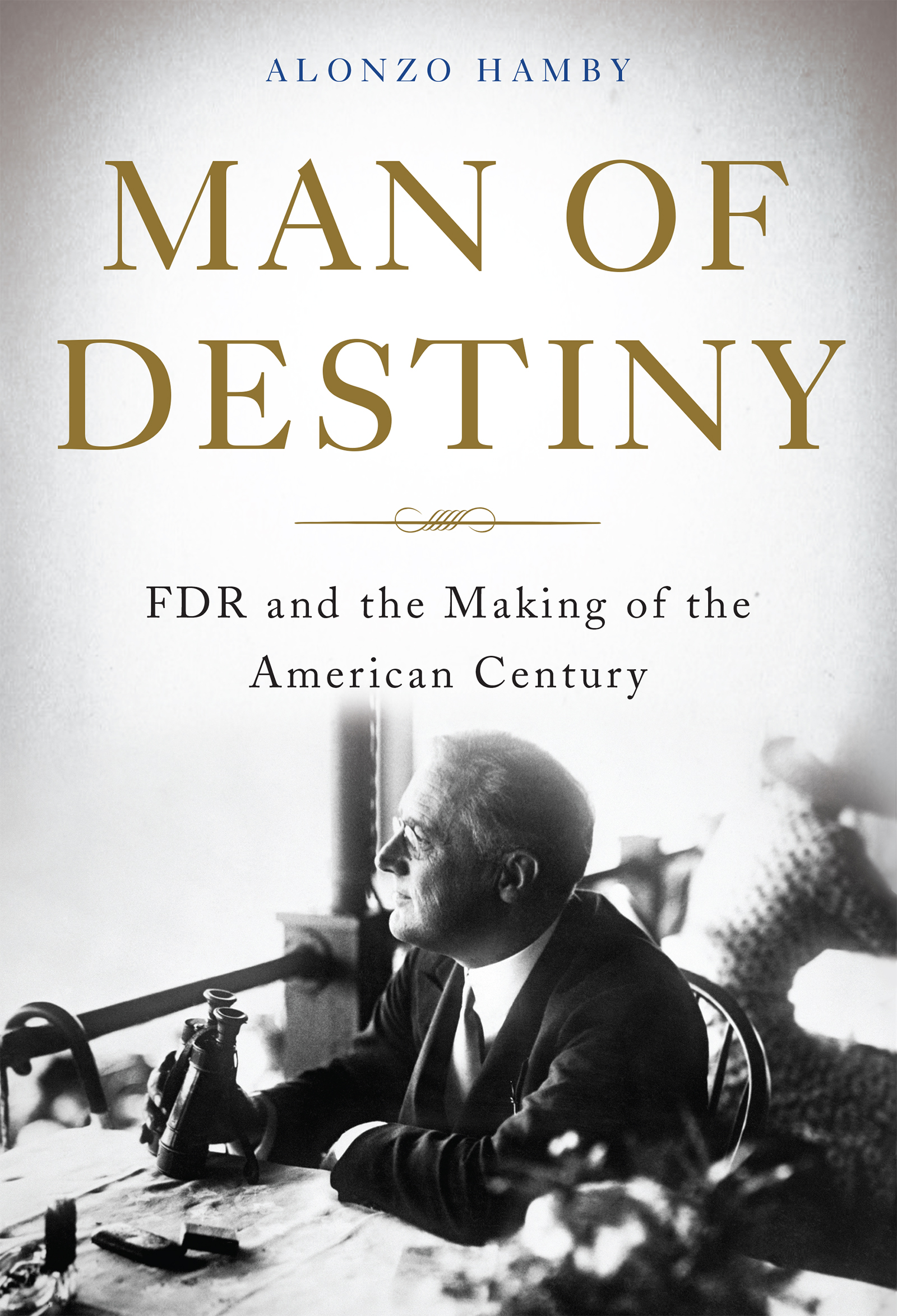Advance Praise for Man of Destiny
No one has written with greater authority on American political leadership in the 1930s and 1940s than Alonzo Hamby. Man of Destiny is simply the best one-volume biography of FDR we havea superb, clear-headed study based on a lifetime of research and hard thinking.
Anthony Badger, author of FDR: The First Hundred Days
FDR remains the most influential, enduring, and enigmatic leader of twentieth-century America. Alonzo Hambys book offers a fascinating portrait of Roosevelt, brilliantly capturing his political prescience and strategic acumen, as well as his personal egotism and intellectual inconsistency. Hamby explains how a very human president contributed to seemingly superhuman outcomes. This book is a must-read for anyone interested in history, politics, and leadership.
Jeremi Suri, author of Libertys Surest Guardian: American Nation-Building from the Founders to Obama
Man of Destiny
FDR and the Making of the American Century
Alonzo L. Hamby
A Member of the Perseus Books Group
New York
Copyright 2015 by Alonzo Hamby
Published by Basic Books,
A Member of the Perseus Books Group
All rights reserved. Printed in the United States of America. No part of this book may be reproduced in any manner whatsoever without written permission except in the case of brief quotations embodied in critical articles and reviews. For information, address Basic Books, 250 West 57th Street, New York, NY 10107.
Books published by Basic Books are available at special discounts for bulk purchases in the United States by corporations, institutions, and other organizations. For more information, please contact the Special Markets Department at the Perseus Books Group, 2300 Chestnut Street, Suite 200, Philadelphia, PA 19103, or call (800) 810-4145, ext. 5000, or e-mail special .markets@perseusbooks.com.
Designed by Jack Lenzo
Library of Congress Cataloging-in-Publication Data
Hamby, Alonzo L.
Man of destiny : FDR and the making of the American century / Alonzo Hamby.
pages cm
Includes bibliographical references and index.
ISBN 978-0-465-06167-9 (e-book) 1. Roosevelt, Franklin D. (Franklin Delano), 18821945. 2. PresidentsUnited StatesBiography. 3. United StatesPolitics and government19331945. 4. World War, 19391945Biography. 5. New Deal, 19331939. I. Title.
E807.H323 2015
973.917092dc23
[B]
2015007617
10 9 8 7 6 5 4 3 2 1
For Joyce,
With thanks for so much,
for so long.
Contents
I have a hazy memory of my mother and father, seated near the family radio, listening to a speech by Franklin D. Roosevelt, likely his last fireside chat, on January 6, 1945. I have a much clearer recollection of hearing the late-afternoon bulletin on April 12, 1945, announcing Roosevelts death, and running to tell my mother.
Above that radio, for many years after the war, hung a wartime map of the world with pictures of Allied civilian and military leaders along its edges. Roosevelt at the top was the most prominently displayed. My parents taught me that he was the greatest of all American presidents. My mother always remembered his birthday and thought she knew his favorite song. (Could it really have been Home on the Range?) My father recalled that when his fortunes were at low ebb during the Depression, Roosevelts speeches had bucked him up. As a teenager, I began a practice of making Christmas donations to the March of Dimes, Roosevelts charity devoted to the treatment and eradication of polio. Some years later, as a professional historian writing about Harry S. Truman, I discovered that much of the controversy about HST revolved around a dispute over whether he was following the course FDR had charted.
A child of wealth and privilege, possessing unlimited will and ambition, Franklin Delano Roosevelt was destined to lead a nation large in population, rich in resources, and committed to a universalist ideology of liberal democracy. His twelve years in the White House culminated in the creation of what can justly be called an American century. This convergence of individual and national destinies created a large and complex story that remains essential to our understanding of the world in which we live today.
History is more than biography, but individual actors nonetheless chart its course. There are many accounts of Roosevelts life, most of them either laudatory tributes or blandly noninterpretive narratives in which large themes get lost. No twentieth-century American lived a bigger or more consequential life. I have attempted to treat it fully but economically and from a point of view that acknowledges genuine achievements while recognizing large failures. I hope I have succeeded in bringing out its meaning without taxing the readers patience.
A. L. H.
Athens, Ohio
January 2015
Becoming FDR
The Best People
Family and Identity, 18821896
My dear Mama.
Thank you so much for the lovly soldiers. Brother Rosy may take a picture of our gardans because it looks so nice. We are going to have a big bush in our gardans and its nearly two feet high. I take my rest evry day but I am not out much We have battles with the soldiers evry day. And they are so nice. Good bye dear Mama Your loving little
Franklin
P.S. Give my love to papa and Uncle Frank and Aunt Laura.
Franklin Delano Roosevelt was six years old when he wrote this letter to his mother, Sara Delano Roosevelt, in the spring of 1888. Franklins birth on January 30, 1882, had been a near-run thing, accomplished only after his mother had undergone twenty-four hours of excruciating labor and the administration of chloroform; the ten-pound baby who emerged then required mouth-to-mouth resuscitation. The boy seems to have retained no buried sense of his precarious entry into existence. He lived contentedly in a safe, structured world, defined by the wealth and authority of his family.
Roosevelts and Delanos, it seemed, had always been there, moneyed and prominent, quiet and steady, exemplifying the virtues of wealth, responsibility, and leadership. By the mid-nineteenth century, both families formed part of a well-defined, self-conscious stratum of the wealthypatricians, the gentility, or the Best People. They treated their inherited wealth as an annuity to invest carefully that it might produce sufficient income to sustain an affluent lifestyle. They served on boards of directors but rarely acted as hands-on managers. They supported charities. In politics, they generally advocated reform in the sense of honest, efficient, and frugal government. But few deigned to run for office.
The first of the American Roosevelts appears to have been a simple farmer from an island off the Dutch mainland, but his descendants prospered as merchants, bankers, investors in land, and sugar refiners. The Roosevelts maintained close family relationships throughout the eighteenth and nineteenth centuries. Possessing modest to substantial wealth, they enjoyed status and esteem as members of the oldest families in New York, the Dutch-based Knickerbocker society.
The Delanos traced their ancestry to French Calvinists (Huguenots) who had fled to the safety of Leiden in the Dutch Republic. In 1621, one of them followed the English Calvinist Pilgrims, who a year earlier had left on the Mayflower for America. His descendants found prosperity as shipbuilders, whalers, and overseas traders. Like the Roosevelts, the Delanos exemplified how early settlement, old money, and entrepreneurial talent over several generations would lead to a special social standing. Warren Delano II made a fortune in what the family later delicately called the China tradeselling opium to the Chinese, a dangerous but extraordinarily lucrative business. He married eighteen-year-old Catherine Lyman in 1843 and fathered eleven children with her.






